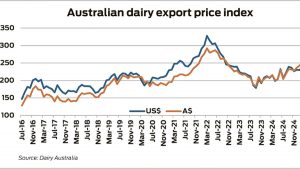
The code will come into effect in January 2020, due in part to the advocacy of Minister for Agriculture Bridget McKenzie’s National Party colleagues.
In March 2019, the government announced the code’s broad principles addressed by the regulation; since then, the code has been developed into a legal text version. The third and final consultation period will be open for four weeks, allowing all stakeholders in the dairy industry to have their say, as dairy farming differs in every state. Policymakers are hoping that the mandatory code will soon help to improve the contractual arrangements between dairy farmers and dairy processors, and provide clear safeguards for how farmers are treated as members of the supply chain.
“Of course we’re not going to solve all the issues facing the dairy industry through the code, which is why we have a suite of other measures including grants to set up cooperatives and grants to help dairy farmers upgrade or invest in energy-efficient equipment to reduce energy costs. I remind the dairy industry again that they are on notice to make sure that the contracts offered to farmers are appropriate and fair ahead of its formal introduction — the community expects no less,” McKenzie said.
The government committed $560,000 to Australian Dairy Farmers to design, develop and market test new milk pricing and trading concepts. The mandatory code is an outcome of the April 2018 Australian Competition and Consumer Commission’s report into the dairy sector; stakeholder consultation is vital to its success. Those concerned about how the mandatory code of conduct could affect Australia’s dairy industry can take part in the survey, to provide their feedback.
























